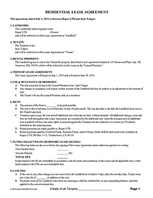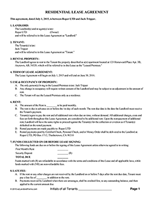Arizona lease laws

There are an estimated 5. Rental Agreement Laws in Arizona. Are rental agreements required in Arizona? Arizona landlord-tenant laws are landlord friendly. These laws inform tenants of important issues like payment of rent, security deposits, living conditions and habitability, terminating a lease , discrimination, and retaliation.
You should always talk with an attorney before attempting to terminate your own lease, deducting the cost for any rental repairs, or asking for damages. The Residential Landlord and Tenant Act that pertains to standard rental housing was enacted to govern the rental of dwelling units and the rights and obligations of landlord and tenant. Cases of Domestic Violence.
You Are a Victim of Domestic Violence. If you enter active military service after signing a lease, you have a right. It prohibits pet owners from allowing their dogs to run at large in public parks or on school properties. Running at large refers to being off-leash and otherwise not in the owner’s control. To terminate either type of agreement, one party must provide the other with written notice.

Landlords can sue their tenants who do not leave their units after their tenancies end. Holdover tenants are those who stay beyond their lease terms. What Is Arizona’s Leash Law?
Arizona’s leash law restricts if and when a pet owner may allow his or her dog to roam off-leash. The universal law aims to help citizens feel safer while walking around public areas, such as parks and fields. Adjustments could be construed to be changes in rules and regulations per A. Termination and Holdover Tenant If the lease allows them to terminate, tenants must terminate a lease agreement before the agreement ends.
The type of notice that a landlord must give depends on the reason for evicting the tenant. Special detainer suits are governed by A. All documents become legally binding upon all parties signing the form and acceptance being relayed to the other party unless both parties sign in the presence of one another. The commercial lease classification is comprised of the business of leasing for a consideration the use or occupancy of real property.
This potentially deadly action is illegal and unconscionable. Lessor: means a person who, in the ordinary course of business, regularly leases , offers to lease or arranges for the leasing of property under a rental-purchase agreement. However, the amount of the security deposit must not exceed an amount “in excess of one and one-half month’s rent. The lease has fewer than 90-days. In order to find a detailed list of all tenant and landlord rights and responsibilities, you should visit the government website of the state of Arizona.

These laws outline tenants rights and notice requirements when asking a tenant to vacate. Known as tenants at will, tenants without leases are bound to the same landlord-tenant laws as tenants with leases. Often the landlord requires each tenant to fill out an application prior to renting the house or apartment.
Obviously, if one party wishes to terminate the lease , it would be for the best to have a tool (such as a documented termination date and terms regarding the damages remedied by a deposit) which can be used by the law to protect both parties. Lease renewals and addendums, and. A tenant can only withhold rent under specific circumstances. Unlike a lot of other states, Arizona’s law specifically. Tenants must inform their landlord of the.

Notice and Entry Rules. Does the tenant have the right to terminate a rental agreement if the landlord failed to make repairs affecting health and safety? Consumer lease : means a lease that a lessor regularly engaged in the business of leasing or selling makes to a lessee who is an individual and who takes under the lease primarily for a personal, family or household purpose, if the. This includes but is not limited to discrimination based on race, gender, family status, religion and disability.
Under Arizona’s dog leash law, dog owners are required to make sure that we establish and maintain direct control over our dogs. This means that as a general rule our dogs must either be: 1.
Comments
Post a Comment